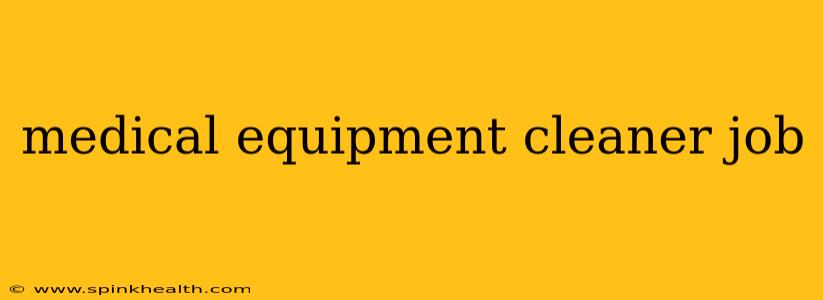A Day in the Life: The Unsung Heroes of Clean Medical Equipment
The sterile scent of disinfectant, the quiet hum of machinery, the weight of responsibility – these are the hallmarks of a medical equipment cleaner's day. It's not a job that often makes headlines, but it's undeniably crucial. Behind the scenes of every hospital, clinic, and medical facility, these dedicated professionals play a vital role in patient safety and the overall smooth operation of healthcare. This isn't just about wiping down surfaces; it's about meticulous attention to detail, adherence to strict protocols, and a deep understanding of infection control.
Let's dive into the world of medical equipment cleaning, exploring the realities of this essential yet often overlooked profession.
What does a medical equipment cleaner do?
A medical equipment cleaner is responsible for the thorough cleaning, disinfection, and sterilization of a wide variety of medical instruments and equipment. Imagine the intricacy: from delicate endoscopes to bulky surgical tools, from tiny probes to complex imaging machines – each piece demands a unique approach to ensure it’s free from pathogens and ready for its next use. The job goes beyond simply scrubbing; it involves meticulous attention to detail, often working with specialized cleaning solutions and equipment. They must be adept at following strict protocols to prevent cross-contamination and maintain a sterile environment.
What are the required skills and qualifications for this job?
While formal qualifications may vary depending on the location and specific facility, a strong work ethic, attention to detail, and a commitment to hygiene are paramount. Many employers look for individuals with a high school diploma or equivalent. On-the-job training is commonplace, where experienced professionals guide newcomers through the specific techniques and protocols relevant to the facility. Understanding basic infection control principles and following strict procedures regarding handling medical waste are vital parts of the training. Beyond that, physical stamina is needed—it's a physically demanding job involving lifting, bending, and standing for extended periods.
What is the salary range for medical equipment cleaner jobs?
Salary expectations for medical equipment cleaners vary based on factors such as location, experience, and the size of the healthcare facility. While precise figures are difficult to pinpoint without specifics, research suggests that the compensation typically falls within a range that offers a stable living wage, though it may be lower than some other healthcare roles. Many positions offer benefits packages that can offset any potential salary differences.
What are the career advancement opportunities?
While the role itself is fundamental, career progression within the field is possible. Experienced and highly skilled medical equipment cleaners might move into supervisory roles, training new staff, or taking on greater responsibilities within the facility's sterilization department. Some individuals may also choose to further their education in related fields, such as infection control or healthcare technology, opening up other advancement pathways.
What is the work environment like?
The work environment is typically within a healthcare setting, potentially including hospitals, clinics, surgical centers, or laboratories. It can be fast-paced, requiring efficiency and precision in a demanding environment. Exposure to various chemicals is possible, emphasizing the importance of proper safety precautions and personal protective equipment (PPE). The work can be physically demanding, and employees often work shifts to ensure round-the-clock coverage.
What are the job prospects for medical equipment cleaners?
The demand for medical equipment cleaners is consistently strong due to the ever-growing healthcare sector and the ongoing need to maintain the highest standards of hygiene and safety. With the aging global population and increased focus on infection control, this role is expected to remain vital for the foreseeable future.
In conclusion, the work of a medical equipment cleaner might go unnoticed, but its impact is undeniable. These dedicated individuals are the unsung heroes of the healthcare system, playing a critical role in maintaining a safe and sterile environment for patients and medical staff alike. Their commitment to precision and hygiene ensures the seamless operation of healthcare facilities, underscoring their invaluable contribution.

